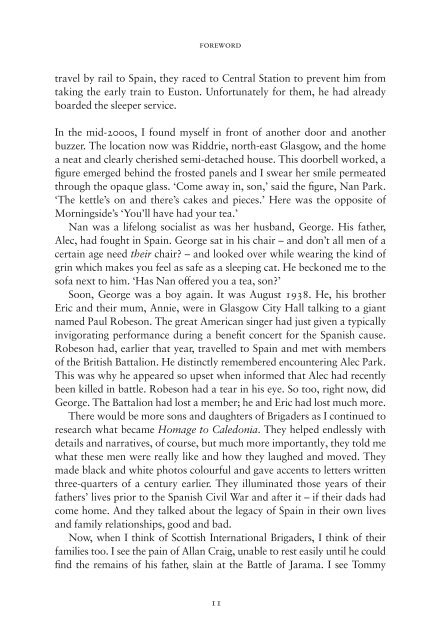Our Fathers Fought Franco by Willy Maley sampler
resonant piece of working class history, this book is a living link to four extraordinary stories. Why did these young men put their lives on the line and go to Spain to fight with the International Brigades? How did they all end up in the same prison cell? And what is their legacy today? James Maley, George Watters, Donald Renton and Archibald Williams were members of Machine Gun Company No. 2 of the XV International Brigade. This is the first book to focus on a small group of men who, from different starting-points, ended up on the same battleground at Jarama, and then in the same prisons after capture by Franco’s forces. Their remarkable story is told both in their own words and in the recollections of their sons and daughters, through a prison notebook, newspaper reports, stills cut from newsreels, interviews, anecdotes and memories, with a foreword by Daniel Gray. Our Fathers Fought Franco is a collective biography that promises to add significantly to the understanding of the motives of those who ‘went because their open eyes could see no other way’.
resonant piece of working class history, this book is a living link to four extraordinary stories. Why did these young men put their lives on the line and go to Spain to fight with the International Brigades? How did they all end up in the same prison cell? And what is their legacy today?
James Maley, George Watters, Donald Renton and Archibald Williams were members of Machine Gun Company No. 2 of the XV International Brigade. This is the first book to focus on a small group of men who, from different starting-points, ended up on the same battleground at Jarama, and then in the same prisons after capture by Franco’s forces.
Their remarkable story is told both in their own words and in the recollections of their sons and daughters, through a prison notebook, newspaper reports, stills cut from newsreels, interviews, anecdotes and memories, with a foreword by Daniel Gray.
Our Fathers Fought Franco is a collective biography that promises to add significantly to the understanding of the motives of those who ‘went because their open eyes could see no other way’.
You also want an ePaper? Increase the reach of your titles
YUMPU automatically turns print PDFs into web optimized ePapers that Google loves.
foreword<br />
travel <strong>by</strong> rail to Spain, they raced to Central Station to prevent him from<br />
taking the early train to Euston. Unfortunately for them, he had already<br />
boarded the sleeper service.<br />
In the mid-2000s, I found myself in front of another door and another<br />
buzzer. The location now was Riddrie, north-east Glasgow, and the home<br />
a neat and clearly cherished semi-detached house. This doorbell worked, a<br />
figure emerged behind the frosted panels and I swear her smile permeated<br />
through the opaque glass. ‘Come away in, son,’ said the figure, Nan Park.<br />
‘The kettle’s on and there’s cakes and pieces.’ Here was the opposite of<br />
Morningside’s ‘You’ll have had your tea.’<br />
Nan was a lifelong socialist as was her husband, George. His father,<br />
Alec, had fought in Spain. George sat in his chair – and don’t all men of a<br />
certain age need their chair? – and looked over while wearing the kind of<br />
grin which makes you feel as safe as a sleeping cat. He beckoned me to the<br />
sofa next to him. ‘Has Nan offered you a tea, son?’<br />
Soon, George was a boy again. It was August 1938. He, his brother<br />
Eric and their mum, Annie, were in Glasgow City Hall talking to a giant<br />
named Paul Robeson. The great American singer had just given a typically<br />
invigorating performance during a benefit concert for the Spanish cause.<br />
Robeson had, earlier that year, travelled to Spain and met with members<br />
of the British Battalion. He distinctly remembered encountering Alec Park.<br />
This was why he appeared so upset when informed that Alec had recently<br />
been killed in battle. Robeson had a tear in his eye. So too, right now, did<br />
George. The Battalion had lost a member; he and Eric had lost much more.<br />
There would be more sons and daughters of Brigaders as I continued to<br />
research what became Homage to Caledonia. They helped endlessly with<br />
details and narratives, of course, but much more importantly, they told me<br />
what these men were really like and how they laughed and moved. They<br />
made black and white photos colourful and gave accents to letters written<br />
three-quarters of a century earlier. They illuminated those years of their<br />
fathers’ lives prior to the Spanish Civil War and after it – if their dads had<br />
come home. And they talked about the legacy of Spain in their own lives<br />
and family relationships, good and bad.<br />
Now, when I think of Scottish International Brigaders, I think of their<br />
families too. I see the pain of Allan Craig, unable to rest easily until he could<br />
find the remains of his father, slain at the Battle of Jarama. I see Tommy<br />
11


















